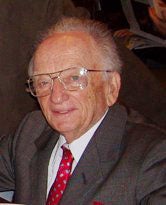
Benjamin Ferencz ’43, known for his role as chief prosecutor in the Nuremburg Trials and for his work promoting an international rule of law and the creation of an International Criminal Court, has been awarded the prestigious Erasmus Prize. The prize is given to individuals who have made “especially important contributions to culture, society, or social science in Europe.”
This year, the focus of the prize was “International Prosecution and Trial of War Crimes and Crimes against Humanity.” Ferencz and another international jurist, Antonio Cassese of Italy, were lauded for being key figures in international trials of war crimes. They will formally receive the award at a ceremony in the Dutch Royal Palace in November.
“Ferencz has fought all his life for an international trial of the most serious violations of humanitarian law and emphasized the importance of individual responsibility,” the prize committee said of the selection.
Born in Transylvania in 1920, Ferencz immigrated to the U.S. with his family when he was ten months old. Growing up in Manhattan, he studied crime prevention at the City College of New York before attending HLS.
After completing his studies, Ferencz joined the U.S. Army, where he served in the 115th AAA Gun Battalion, an anti-aircraft artillery unit. In 1945, he was transferred to the headquarters of General Patton’s Third Army, where he was assigned to a newly created War Crimes Branch tasked with collecting evidence of Nazi brutality and apprehending the criminals. In that capacity, he was sent to the concentration camps as the prisoners were being liberated.
Ferencz was honorably discharged from the Army at the end of 1945 and returned to private practice in New York. Soon after, he was recruited for the Nuremberg war crimes trials, which were already in progress. At 27, he became the chief prosecutor for the U.S. in the Einsatzgruppen Case, in which 22.defendants were charged with murdering over a million people. All were convicted, and 13 were sentenced to death.
After the Nuremberg Trials, Ferencz returned to private practice for 13 years. Influenced by his previous experience in WWII and by the Vietnam War, he decided to devote himself to the creation of an International Criminal Court. He was an adjunct professor of international law at Pace University from 1985 to 1996, and he published several books arguing for an international legal system, including: “Defining International Agression: The Search for World Peace” (1975), “An International Criminal Court: A Step Toward World Peace” (1980), “Enforcing International Law: A Way to World Peace” (1983), and “PlanetHood” (1988).
In the late 1990s, Ferencz began to see his dream come to fruition: the international community began debating the creation of an International Criminal Court. A statute establishing the court was adopted by the United Nations General Assembly in 1998 in Rome. In 2002, the Rome Statute was entered in force. Ferencz has since been active at Preparatory Commission sessions for the ICC, monitoring and making available his expertise on current efforts to define aggression.
The Erasmus Prize was established in 1958 by the Praemium Erasmianum Foundation, a Dutch non-profit organization founded by Prince Bernhard of the Netherlands aimed at strengthening the humanities and arts. The organization and the Erasmus Prize derive their name from the Dutch humanist scholar Desiderius Erasmus, a renowned theologian and scholar. Past winners of the prize include: Abdulkarim Soroush, Adam Michnik, Mary Robinson, Peter Sellars, Renzo Piano, Vaclav Havel, Isaiah Berlin, Ingmar Bergman, Marc Chagall, and Robert Schuman. This year’s award carries an award of 150,000 Euros.